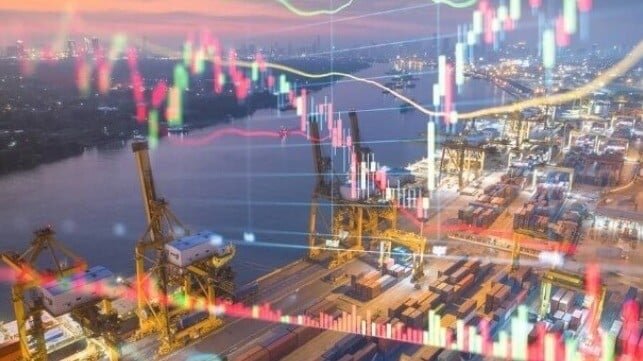With the VWT in place, every actor had access to real-time, primary data, enabling them to anticipate disruptions and collaborate on solutions. The shipper rerouted the cargo to an alternative port, avoiding congestion and ensuring timely delivery. The port operator adjusted its operations to accommodate the change, while the carrier optimized its vessel schedule to minimize emissions. By sharing data and intelligence, the ecosystem achieved a win-win-win outcome: the cargo arrived on time, emissions were reduced, and all actors improved their operations.
This scenario illustrates the power of collective intelligence and ecosystem-level innovation. By breaking down data silos and enabling secure, transparent data exchange, the VWT empowers actors to make informed decisions, collaborate effectively, and drive operational efficiencies. In a world of increasing complexity and volatility, this federated approach to digital infrastructure offers a path to resilience, sustainability, and innovation.
Conclusion
As the world grapples with the challenges of a post-pandemic, climate-stressed future, the need for resilient, sustainable supply chains has never been greater. Both project44’s Movement platform and the Virtual Watch Tower represent bold attempts to address these challenges, each with its own philosophy, architecture, and impact. Movement focuses on execution, leveraging AI to drive actionable insights and automation, while the VWT prioritizes collective intelligence, enabling ecosystem-wide collaboration and innovation.
Ultimately, the supply chain of the future will likely require a combination of both approaches: execution-focused platforms like Movement to drive operational efficiency and agility, and federated ecosystems like the VWT to foster transparency, collaboration, and sustainability. By embracing the strengths of each model and harnessing the power of collective intelligence, organizations can navigate the complexities of the modern logistics landscape and build supply chains that are not only resilient and efficient but also sustainable and innovative.
It is an exciting time for the logistics industry, as new technologies and collaborative frameworks open up new possibilities for transforming supply chain operations. By embracing these innovations and working together as a global community, we can create a future where supply chains are not just resilient and efficient, but also sustainable and value-creating for all stakeholders.
The VWT’s approach to data-empowered collaboration, philosophical and structural differences, the role of AI, governance and ecosystem impact, and the industry as a whole all highlight the need for a more inclusive and federated approach to supply chain management. By bringing together diverse stakeholders in a shared digital space, the VWT aims to foster trust, transparency, and resilience in the industry.
As the supply chain and logistics sector continues to evolve, platforms like Movement and the VWT offer complementary solutions that address different needs within the industry. While Movement focuses on delivering value to individual enterprises through automation and optimization, the VWT aims to create a neutral, federated backbone for ecosystem-wide collaboration and innovation.
The future of supply chain management may lie in the convergence of these two models, with proprietary platforms driving execution and efficiency for individual companies, while federated backbones enable broader collaboration and innovation across the industry. By learning from the lessons of both Movement and the VWT, the industry can work towards building a more efficient, transparent, and resilient supply chain of the future.
The Future of Supply Chain: Building Resilience Through Collaboration
The supply chain is not just a collection of individual actors but a complex, interdependent ecosystem. Its resilience depends not only on technology but also on trust, governance, and a shared purpose. The choice is not either/or. The industry needs both: strong execution power and federated approaches. The urgent need is to build bridges—technical, organizational, and cultural—between these worlds, creating a supply chain that is not only efficient and automated but also resilient, transparent, and inclusive.
The supply chain networks of the future will not be built by any single company or platform. They will be co-created by collaborating actors, shaped by shared interests and goals. The leading networks will be those that are based on a shared vision and common values and sustained by trust. The journey has begun. The question is: who will join the leaders, and how far will we go together?
About the Authors:
Mikael Lind is the world’s first (adjunct) Professor of Maritime Informatics engaged at Chalmers and Research Institutes of Sweden (RISE). He is a well-known expert frequently published in international trade press, is co-editor of the first two books on Maritime Informatics, and is co-editor of the book Maritime Decarbonization.
Wolfgang Lehmacher is a global supply chain expert, partner at Anchor Group, and advisor at Topan AG. The former director at the World Economic Forum and CEO Emeritus of GeoPost Intercontinental is an advisory board member of The Logistics and Supply Chain Management Society, an ambassador for F&L, and an advisor to Global:SF and RISE. He contributes to the knowledge base of Maritime Informatics and is a co-editor of the book Maritime Decarbonization.
Xiuju Fu is Maritime AI Programme Director and senior principal scientist at Institute of High Performance Computing, Agency for Science Technology and Research (A*STAR), Singapore and active in developing and applying AI, big data intelligence, simulation, and optimization techniques for complex system management. Currently, she is leading Maritime AI Programme in Singapore for research in maritime data excellence, maritime AI modelling excellence, maritime AI computing and application excellence.
Jens Lund-Nielsen (IOTA Foundation) is an expert advisor to the UK Parliament, World Economic Forum and multiple corporations. Previous employers include A. P. Moller – Maersk and pwc. Jens is a pioneer in building public-private partnerships to enable better trade for all, including co-founder of the Global Alliance for Trade Facilitation and the Logistics Emergency Teams with World Food Programme.
Footnotes:
[i] A Basu Bal, ‘Technology-Mediated Organisation of Transport Actors: Laytime in Perspective’ (2023) 29(6) Journal of International Maritime Law 346–365.
A Basu Bal, ‘The Emerging Interface of Digital Innovation and Sustainability in Transport’ (2024) 24(7) Lloyd’s Shipping & Trade Law 1–4.
The opinions expressed herein are the author’s and not necessarily those of The Maritime Executive.

